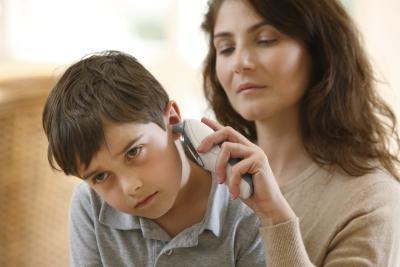Young children are exposed to many germs in their daily lives, so it is no surprise that childhood fevers are a fairly common occurrence. A fever is not an illness in itself, but it is a symptom of an illness or infection. As a parent, it is important to understand how to care for a child with an elevated body temperature and when a fever is a sign of an illness severe enough to require medical attention.
Significance
The normal body temperature of a child varies throughout the day and is based on his activity level. A child whose body temperature has elevated above 99 degrees F is considered feverish. A fever can be caused by any number of things, including a virus, bacterial infection, the flu and the common cold. You can determine whether your child has a fever by taking his temperature, rectally for younger children and orally for older children. The treatment you give your child will largely depend on what the underlying cause of the fever is. Some fevers will go away on their own without any additional treatment. Symptoms of a fever include headaches, body aches, sweating, shivering and weakness.
Treating a Low Grade Fever
A child whose body temperature is between 100 to 102 degrees F has a low-grade fever, although the severity of your child’s illness is not directly correlated to the temperature but rather in the way your child is behaving. A child with a low-grade fever who is acting lethargic and unresponsive is much sicker than a child with a higher fever who is active and alert.
Many low-grade fevers require no treatment. Acetaminophen can be given to lower fever and relieve some of the symptoms associated with the fever. Keeping your child hydrated is essential if he has a fever, although children often refuse liquids when they aren’t feeling well. If your child won’t drink, try offering frozen juice pops or small amounts of liquid throughout the day.
Treating a High Fever in Children
A high fever is defined as a fever that is above 102 degrees F. A fever in this range often makes parents nervous. A high fever is not necessarily a sign that your child is sicker than a child with a low-grade fever, but it does mean that, as a parent, you will want to monitor your child’s temperature closely to be sure that it does not go too high. Hydration is extremely important for a child with a high fever. Over-the-counter medication can be used to try and lower the fever, but since it will not cure the fever itself, it will need to be re-administered each time it wears off.
High fevers can lead to febrile seizures, which although frightening, are not usually dangerous. Keep your child safe during the seizure by moving any objects around him that may hurt him if he bumps into them, and follow up with your child’s pediatrician after the seizure is over.
Keeping a Feverish Child Comfortable
The symptoms of a fever can be uncomfortable for a child, but they are generally not harmful. Make sure your child drinks plenty of liquids to avoid dehydration. A child with a fever may be hot or cold (or alternate between the two), so use blankets to help keep your child at a comfortable temperature. Be careful to avoid overheating him. Children with a fever may enjoy a few special treats, such as frozen juice pops, a special movie, or quiet story time with mom or dad, as a distraction.
When to Call the Pediatrician
While most fevers will resolve on their own, it is important that every parent knows when it’s time to call the doctor. Anytime a child is unresponsive or displaying behavior that is not normal for the child, it’s best to consult with a pediatrician. Since the temperature of the fever is not always a good indication of how sick a child is, a parent needs to be observant and look for any extreme changes from the child’s normal behavior. A fever that is accompanied by a rash or vomiting needs to be seen by a doctor, as does a fever in an infant under 3 months of age. A fever that lasts more than a day for children under 2 years of age or more than 3 days for children over 3 years of age should also be seen by a doctor.





